Lebanese Prime Minister Hassan Diab urged the international community during the virtual the IV Brussels Conference on Tuesday, to shield Lebanon from the repercussions of the Caesar Act against Syria, National News Agency reported.

Tuesday’s virtual meeting is the eighth Syria pledging conference, and the fourth hosted by the EU, which estimates that it has donated around 20 billion euros ($23 billion) to Syria and the region over the years. Around 60 countries, key U.N. agencies and others involved in the conflict are expected to take part.
“We call on the international community to ensure that these repercussions do not affect the means of commercial and economic communication between Lebanon and foreign countries, and thus undermine our continued efforts to exit from the current crisis in the country,” Diab who is supported by the Iranian backed Hezbollah militant group and its allies said .
Diab said that Lebanon is “determined to cooperate in order to alleviate the suffering of refugees,” but noted that the presence of Syrian refugees in Lebanon immensely impacts its already stricken economy.
“Lebanon hosts a large number of Syrian refugees compared to other countries costing the economy billions of dollars,” he said, noting how Syrian students have been incorporated into Lebanese schools which is going to increase the pressure even more as Lebanese shift to public schools because of the economic crisis.
20 private schools decided to close down because of the collapse of the economy and lay off thousands of teachers . This will reportedly result in increased pressure on public schools
Diab noted that COVID-19 outbreak in the country accelerated the closure of thousands of businesses and the lay-off of a big number of employees, which increases the potential of conflicts between local people and Syrian refugees due to the economic deterioration.
The war in Syria has killed more than 500,000 people and sparked a refugee exodus that has destabilized neighboring countries and impacted Europe.
Around 11 million people are in need of humanitarian assistance, and some 9 million don’t have enough to eat. More than half of the population have no jobs.
Agencies


Leave a Reply
You must be logged in to post a comment.